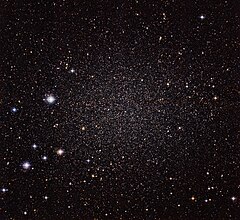Karzeł Rzeźbiarza
| ||
 Zdjęcie ESO | ||
| Odkrywca | Harlow Shapley | |
| Data odkrycia | 1937 | |
| Dane obserwacyjne (J2000) | ||
| Gwiazdozbiór | Rzeźbiarz | |
| Typ | karłowata sferoidalna, dE3 | |
| Rektascensja | 01h 00m 09,4s | |
| Deklinacja | –33° 42′ 32″ | |
| Odległość | ok. 280 000 ly[1] (ok. 86 000 pc) | |
| Przesunięcie ku czerwieni | 0,00036 | |
| Jasność obserwowana | 10,5m | |
| Rozmiary kątowe | 39,8' × 30,9' | |
| Alternatywne oznaczenia | ||
| Scl dSph, ESO 351-30, LEDA 3589, MCG-06-03-015, Anon 0057-33, IRAS F00574-3400 | ||
Karzeł Rzeźbiarza (Scl dSph) – karłowata galaktyka sferoidalna znajdująca się w konstelacji Rzeźbiarza w odległości około 280 000 lat świetlnych od Ziemi. Galaktyka ta została odkryta w 1937 roku[1] na kliszach fotograficznych Boyden Observatory przez Harlowa Shapleya.
Karzeł Rzeźbiarza jest członkiem Grupy Lokalnej oraz satelitą Drogi Mlecznej. Galaktyka ta jest prawdopodobnie dwukrotnie większa od Karła Małej Niedźwiedzicy, lecz jej gwiazdy są podobnie stare[2].
Zobacz też
Przypisy
- ↑ a b Nieśmiała galaktyczna sąsiadka (ang.). ESO Polska, 16 września 2015. [dostęp 2015-09-26].
- ↑ Richard Powell: The Universe within 500000 Light Years The Satellite Galaxies (ang.). W: Atlas of The Universe [on-line]. [dostęp 2015-09-17].
Linki zewnętrzne
- Karzeł Rzeźbiarza w bazie SEDS (ang.)
- A Shy Galactic Neighbor – The Sculptor Dwarf Galaxy (ang.). W: SciTech Daily [on-line]. 2015-09-16. [dostęp 2015-09-17].
- Karzeł Rzeźbiarza w NASA/IPAC Extragalactic Database (ang.)
- Karzeł Rzeźbiarza w bazie SIMBAD (ang.)
Media użyte na tej stronie
Updated map of Milky Way, added new discovered branch of the Orion Spur, added Perseus Transit
Autor: ESO, Licencja: CC BY 4.0
The Sculptor Dwarf Galaxy, pictured in a new image from the Wide Field Imager camera, installed on the 2.2-metre MPG/ESO telescope at ESO’s La Silla Observatory, is a close neighbour of our galaxy, the Milky Way. Despite their proximity, both galaxies have very distinct histories and characters. This galaxy is much smaller, fainter and older than the Milky Way and appears here as a cloud of faint stars filling most of the picture. Many other much more distant galaxies can be seen shining right through the sparse stars of the Sculptor Dwarf.


